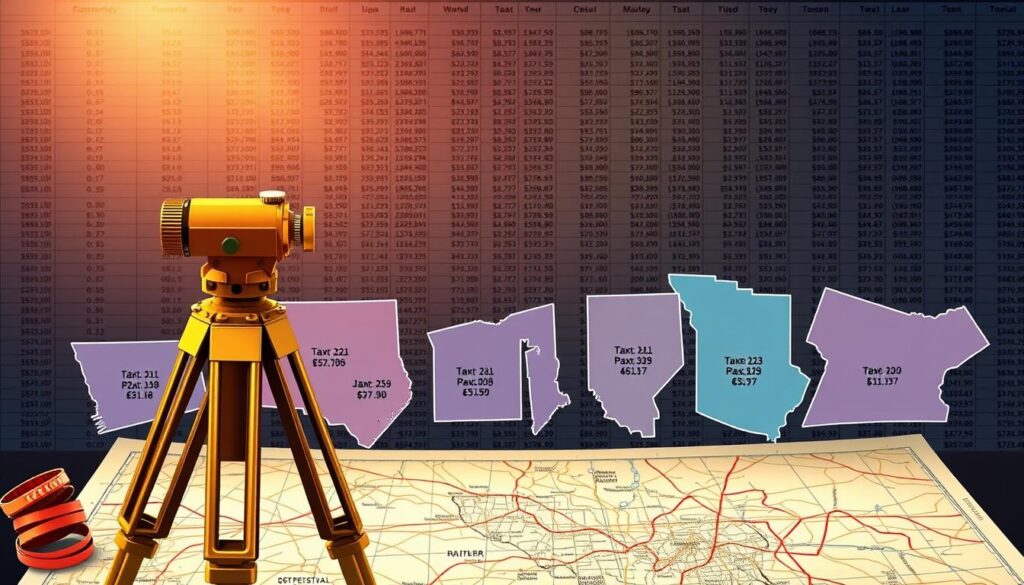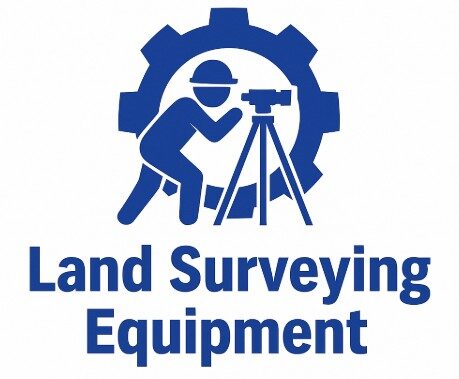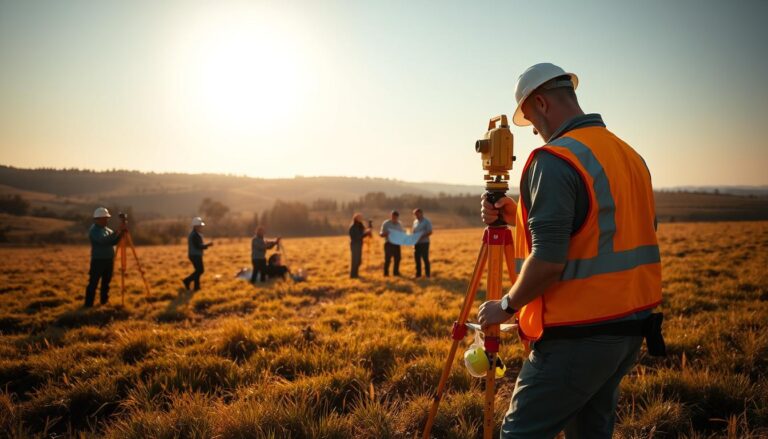Surveying Credentials: Navigating Licensing Across States
The job of surveying is key in building and managing our infrastructure. It needs exact measurements and a good grasp of legal lines. Surveyors wanting to work in new places face a big challenge: dealing with licensing rules in different states.
It’s vital for surveyors to know the rules and needs of each state they want to work in. They must understand the technical side of surveying and the laws that govern it in various places.
Key Takeaways
- Surveyors need to understand the different licensing requirements for each state they wish to work in.
- The process of obtaining a license in another state can be complex and time-consuming.
- Knowledge of both technical surveying skills and legal requirements is crucial.
- Surveyors must stay updated on changes in regulations across states.
- Expanding a surveying practice across state lines requires careful planning and compliance with local laws.
The Current Landscape of Surveying Licensure in the United States
The surveying field in the U.S. faces a complex set of state-specific rules. Each state has its own rules and standards for who can work as a surveyor. This makes the profession vary a lot from one place to another.
State-by-State Regulatory Framework
States manage the rules for surveying licenses. This leads to a wide range of requirements. Some states focus more on education, while others look at exam scores or experience.
Key aspects of state regulations include:
- Educational requirements, such as degree specifications and coursework
- Examination requirements, including the type and content of licensing exams
- Experience requirements, detailing the amount and type of professional experience needed
Core Requirements Across Jurisdictions
Even with different rules, there are some common requirements. These include:
- A bachelor’s degree in surveying or a related field
- Passing the Fundamentals of Surveying (FS) exam and the Principles and Practice of Surveying (PS) exam
- A certain number of years of professional experience under the supervision of a licensed surveyor
These basics are the foundation of becoming a licensed surveyor. They are widely accepted across the country.
Recent Trends in Surveying Licensure
Recent changes in surveying licensure show the field’s growth and new rules. Some key trends are:
- More technology use in surveying, leading to new specializations
- More focus on ongoing education to keep licenses
- Steps towards national standards, helped by groups like the National Council of Examiners for Engineering and Surveying (NCEES)
These changes show the field is evolving. It’s adapting to new tech, changes in the workforce, and the need for easier movement between states.
Licensing Across State Lines: Is It Worth Expanding Your Surveying Credentials?
The surveying industry is getting more competitive. Getting a license in more states can really help. It can open up new chances, grow your client list, and boost your career.
The Business Case for Multi-State Licensing
Getting a multi-state surveying license can really grow your business. You can work on projects in different areas, which means more money. This is great for surveyors on big projects that need to cross state lines.
The good things about multi-state licensing are:
- You can reach more people and get more clients.
- You’ll be seen as more credible and competitive.
- You can work on a variety of projects in different states.
- You might make more money from new business chances.
Potential Return on Investment
Getting a multi-state surveying license costs money at first. But, the benefits can be huge. You can enter new markets and make more money.
The benefits include:
- You’ll get more project chances and make more money.
- You’ll have better career chances because you’re more visible and credible.
- You can work on different projects in different states.
Career Advancement Opportunities
Having a multi-state surveying license can also boost your career. Surveyors with licenses in many states are seen as more flexible and appealing to employers or clients.
Here are some career chances:
- You might get leadership roles in big projects.
- You could work with famous clients or on big projects.
- You might even get to be a partner or owner in a firm.
Understanding Reciprocity Agreements Between States
Surveyors looking to work in different places face a complex web of reciprocity agreements between states. These agreements let licensed surveyors work in other places with varying levels of ease.
Reciprocity is key for surveyors wanting to work in more places. It affects surveying license portability, letting them work in different areas without needing a new license for each state.
Full Reciprocity vs. Partial Recognition
There are two main types of reciprocity agreements: full reciprocity and partial recognition. Full reciprocity means one state fully accepts another state’s license, making it easy for surveyors to get a new license.
Partial recognition is more complex. It might require extra exams, experience, or education beyond the original license. Knowing this is crucial for surveyors working across state lines.
Regional Compacts and Agreements
Some states have regional compacts or agreements that make getting a license in another state easier. These compacts help improve surveying license portability among member states.
For example, some states have agreements that make it simpler for neighboring states to recognize licenses. This helps surveyors work more easily in these areas.
States with the Most Favorable Reciprocity Terms
Finding states with the best reciprocity terms is important for surveyors wanting to grow their practice. Some states have more open policies on surveyor license reciprocity, making it easier for out-of-state surveyors to get licensed.
| State | Reciprocity Type | Additional Requirements |
|---|---|---|
| Florida | Full Reciprocity | None |
| Texas | Partial Recognition | Additional Exam |
| California | Partial Recognition | Experience and Law Exam |
By understanding reciprocity agreements, surveyors can make smart choices about where to work. This helps them use surveyor license reciprocity to their advantage.
The NCEES Record: Streamlining Multi-State Licensing
For surveyors wanting to work in different states, the NCEES Record is a big help. It makes getting licensed in many places easier. This opens up more job chances and makes work more flexible.
What is the NCEES Record?
The NCEES Record is a tool from the National Council of Examiners for Engineering and Surveying (NCEES). It lets surveyors keep all their credentials in one spot. This includes education, exams, and work experience. It makes getting licensed in many states simpler.

Benefits for Multi-State Practitioners
The NCEES Record has many benefits for those working in different states. It makes getting licensed easier. Surveyors don’t have to send the same documents over and over. It also makes sure all information is correct and up-to-date, avoiding delays.
Another big plus is the freedom to move around. With an NCEES Record, surveyors can easily find work in new places. This is great for growing a business or exploring new markets.
Application Process and Maintenance
To get an NCEES Record, surveyors need to meet certain requirements. This usually means having a current license in the U.S. They need to send in documents and pay a fee to NCEES. Then, the record is ready for state licensing boards.
Keeping the NCEES Record up-to-date is important. Surveyors must tell NCEES about any changes, like a new address or license status. This way, they can keep enjoying the benefits of the NCEES Record.
Navigating Comity Applications: Step-by-Step Process
Understanding comity applications is key for surveyors wanting to work in different states. Getting licensed in more places can boost your career and open up new business chances.
Required Documentation and Credentials
The first step is to collect all needed documents and credentials. You’ll need:
- Original License: A copy of your original surveyor’s license.
- Transcripts: Official transcripts from your school.
- Experience Verification: Proof of your work experience, like letters from employers or client feedback.
- Examination Records: Records of any exams you’ve passed, like the NCEES exam.
Common Pitfalls and How to Avoid Them
Surveyors face many challenges when applying for comity. Some common issues include:
- Incomplete Documentation: Make sure you submit all required documents.
- Mismatch in Records: Check that your records are correct in all states and databases.
- Failure to Meet State-Specific Requirements: Learn and follow the specific rules of the state you’re applying to.
Timeline Expectations for Different States
The time it takes to process comity applications varies by state. Here’s a look at typical times:
| State | Average Processing Time |
|---|---|
| California | 3-6 months |
| New York | 2-4 months |
| Texas | 4-8 months |
Knowing these times helps surveyors plan better. It ensures they meet their career and business goals.
Financial Considerations of Multi-State Licensing
Surveyors planning to work in more than one state need to think about the money side. This includes the upfront costs, ongoing expenses, and taxes.
Initial Application Costs
Getting a surveying license in a new state has its own costs. You’ll pay for application fees, exam fees, and to get the needed documents. For example, the application fee can be from $100 to over $500, based on the state’s professional licensing regulations.
| State | Application Fee | Examination Fee | Total Initial Cost |
|---|---|---|---|
| California | $300 | $200 | $500 |
| Texas | $250 | $150 | $400 |
| Florida | $400 | $250 | $650 |
Renewal Fees and Schedules
After getting a license, you’ll also face renewal costs in different states. Renewal fees change, and so do the schedules. Some states renew every year, others every two years.
Renewal Fee Comparison:
- California: $200 every 2 years
- Texas: $150 annually
- Florida: $250 every 2 years
Tax Implications of Working Across State Lines
Surveyors working in many states face complex tax issues. This includes state income taxes and what kind of business to set up.
State Income Tax Considerations
States tax income differently. Knowing these rules helps manage taxes well.

For those running a business, knowing the rules in each state is key. This means registering your business, getting the right licenses, and following state laws.
By thinking about these financial points, surveyors can wisely decide to work in new states. They’ll follow the surveying license application process rules and do well financially.
Continuing Education Requirements Across Jurisdictions
Keeping a surveying license in multiple places means knowing the continuing education rules well. Surveyors need to understand the different rules to keep their licenses. This is crucial to avoid any problems.
Tracking CE Credits for Multiple States
Surveyors with a multi-state surveying license face a big challenge. They must keep track of continuing education credits in each state. Each state has its own rules, like how many hours are needed, what topics to cover, and how often to report.
To handle this well, surveyors can use a single system to track their CE credits. They can use special software or a detailed spreadsheet. This helps them meet the needs of each state where they are licensed.
States with Compatible CE Requirements
Some states have the same continuing education rules, making it easier for surveyors. For example, states in the same area might have the same CE rules. This makes it simpler for surveyors working in these places.
Surveyors should look up the specific CE rules for each state where they are licensed. This helps them plan their education better.
Efficient Strategies for Meeting Multiple Requirements
To meet continuing education needs in many states, surveyors can use smart strategies. One way is to choose courses that are useful in many places. This way, they can use their CE credits in more states.
- Look for common topics like ethics or surveying technology that are needed in many states.
- Use online courses that are accepted in several states. This gives them flexibility and broad use.
- Keep good records of CE credits earned, including what the courses were about and where they are approved.
By using these strategies, surveyors can manage their continuing education needs well. This ensures they meet the rules in all the places they work.
Technology and Tools for Managing Multiple State Licenses
Surveyors need to be organized and use technology to manage multiple state licenses. As the field changes, digital tools are key for easy license management.
Keeping track of different licenses and their renewal dates is a big challenge. Technology offers tools to make this easier.
License Management Software
License management software is a big help for surveyors. It lets them store and check license info, track renewal dates, and get reminders. Some top software includes:
- License management modules within professional association platforms
- Specialized software for those with licenses in many states
- Cloud-based solutions for easy access from anywhere
Calendar Systems for Renewal Deadlines
Calendar systems are also key for keeping track of renewal dates. By adding license renewal dates to a digital calendar, surveyors can avoid missing important deadlines. Look for features like:
- Recurring event reminders
- Syncing across different platforms
- Customizable alerts
Document Organization for Multiple Jurisdictions
Keeping documents organized is crucial for surveyors in many places. This includes licenses, certifications, and continuing education records. Digital document management systems help keep everything in order. Good practices include:
- Using clear file names
- Creating a logical folder system
- Using metadata for quick searches
Using these technologies and tools makes managing multiple state licenses easier. It reduces paperwork and lowers the chance of not meeting requirements.
Strategic Approaches to Expanding Your Practice Territory
To grow your surveying practice, you need to know the licensing rules and market trends in new areas. This means looking at where demand is high, planning your move, and building a strong network.
Identifying High-Opportunity States
Finding states with a big need for surveying services is key. Look at market trends, the competition, and where big projects are happening.
- Research states with growing construction and infrastructure projects.
- Analyze the competitive landscape to identify areas with less competition.
- Consider states with favorable business environments and regulatory frameworks.
Creating a Phased Expansion Plan
A step-by-step plan helps you enter new markets slowly. This way, you can manage your resources and risks better. Your plan should include:
- Initial market research and feasibility studies.
- Getting the right licenses and following state rules.
- Setting up a local presence, like an office or hiring locals.
Building Professional Networks in New Territories
Having a strong network in new areas is crucial for your practice’s success. You can do this by:
- Going to local industry events and networking.
- Joining local professional groups and societies.
- Connecting with local businesses and clients on social media.
Key benefits of a strong network include local insights, potential partnerships, and a stronger presence in the market.
Legal and Ethical Considerations When Practicing Across State Lines
Surveying across state lines needs a deep understanding of laws and ethics. Surveyors must know about professional licensing regulations and surveying license portability when working in new places.
Liability Insurance Requirements
Liability insurance is key when working in different states. Each state has its own rules for insurance. Surveyors must make sure their insurance covers them well in each state they work in.
They might need to get insurance that works in many states. This could be one big policy or separate ones for each state. Knowing each state’s insurance rules is important to stay safe and follow the law.
Jurisdiction-Specific Standards of Practice
Surveyors must follow rules that vary by state. These rules cover things like how to mark boundaries and use technology. It’s important to keep up with these changes to do good work.
For example, some states have rules about what kind of markers to use for boundaries. Others have rules for using GPS. Following these rules helps surveyors do their job right and avoid legal trouble.
Managing Client Expectations in Different Regions
It’s also important to know what clients in different areas expect. Clients in different places might have different ideas about how to work together. Surveyors need to understand these differences and adjust their work to meet client needs.
This might mean offering special services for certain areas or changing how they talk to clients. By doing this, surveyors can build trust and be seen as reliable and professional in many places.
Conclusion
Getting your surveying credentials across state lines can really boost your career and business. It’s important to understand the rules and steps involved. This helps you work in different places.
The journey includes dealing with laws, agreements, and ongoing education. Tools like the NCEES Record and software help keep things smooth and in line with rules.
As the surveying field changes, having licenses in more states can give you an advantage. It’s key to think about the costs, laws, and ethics of working in different places. This ensures you grow your career well.
By planning carefully for multi-state licenses, you can grab new chances, make professional connections, and grow your business.






